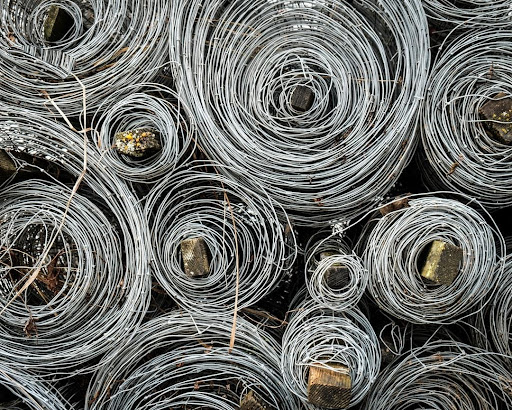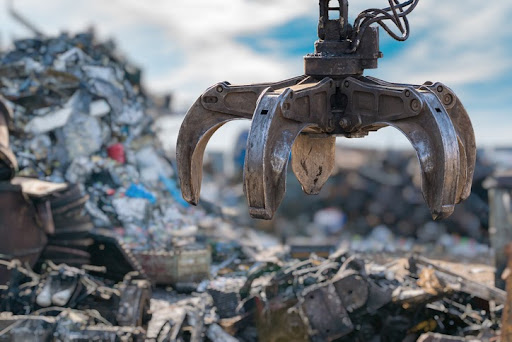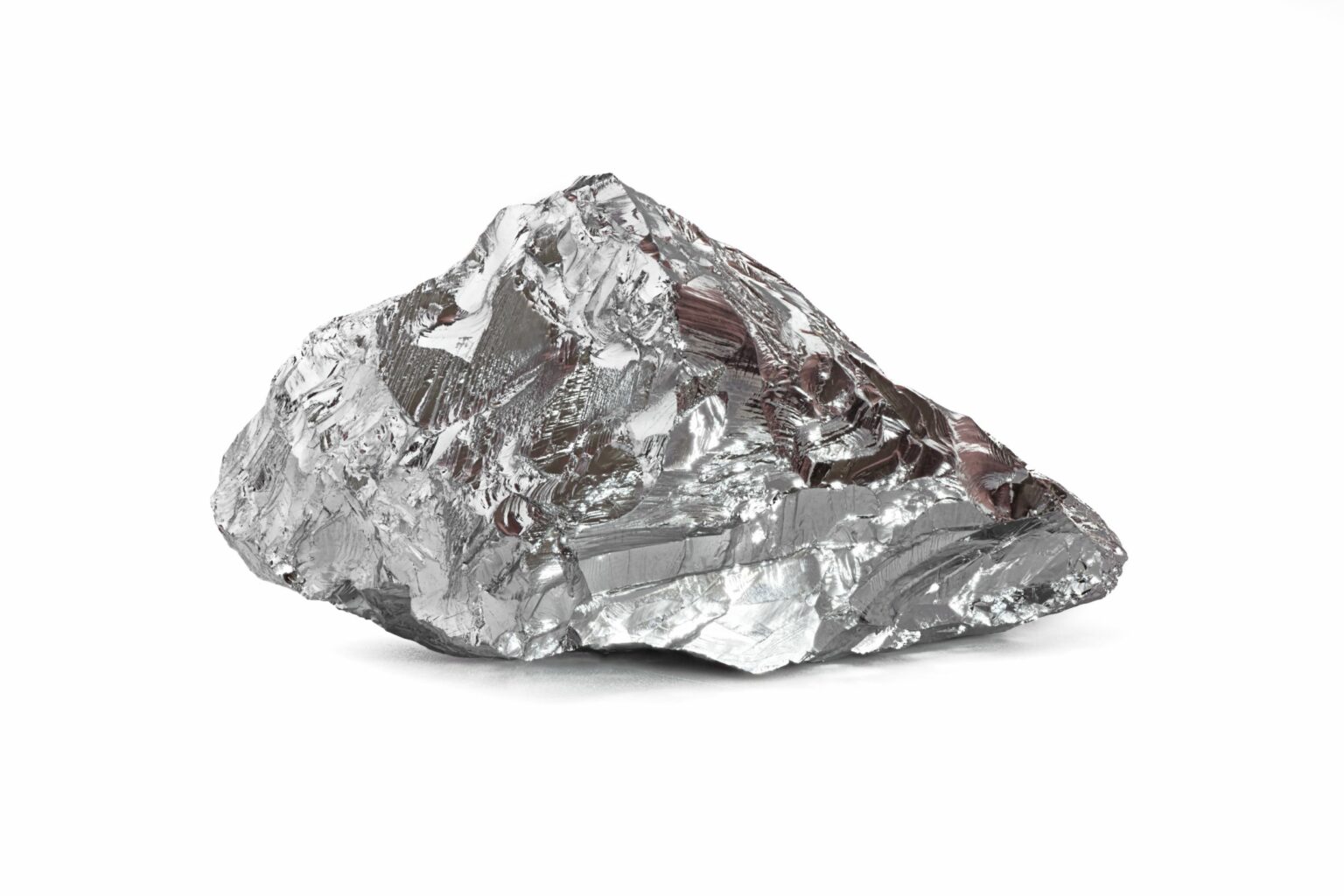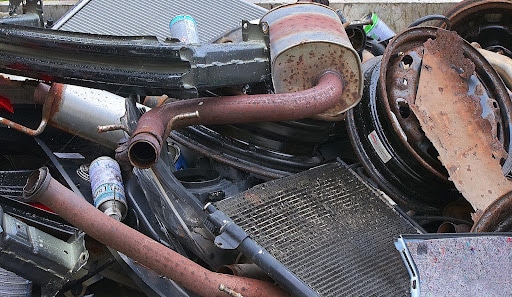Each year, the United States Geological Service (USGS) releases commodity summaries on the metals and minerals consumed worldwide. In 2019, 104.5 million tonnes of base metals (aluminum, copper, zinc, lead, nickel, and tin) were produced, as well as 3.2 billion tonnes of iron and steel, and, per capita, each human consumes an average of 13 metric tonnes of material per year.
These staggering figures reveal our dependence upon metals and minerals, and serve as a stark reminder of the importance of metal recycling. Our ever-developing world continues to demand more and more metals, and our planet only has a fixed amount to offer. This makes metal recycling essential for our continuing prosperity — and it carries many environmental and financial benefits with it as well. Efficient, cost-effective and repeatable, metal recycling has the potential to remedy many of our material scarcity woes — and it’s been part of the solution for a long time.
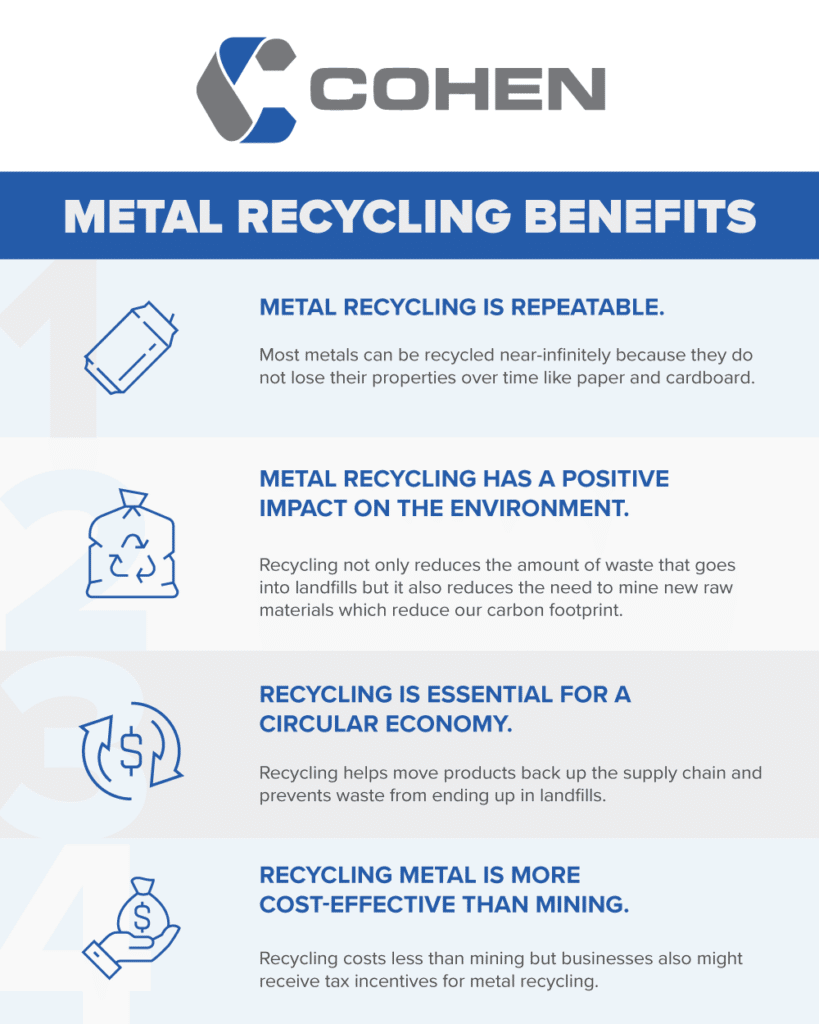
Recycling Benefit 1: Repeatability
One of metal and iron recycling’s greatest advantages is the fact that it can be done near-infinitely. Other recyclable goods, like paper, plastic, or cardboard, lose their material properties as they degrade with each use, but this isn’t the case with metals. Whereas paper products possess shorter and shorter fiber lengths until they became unusable, metals can be re-melted and formed back into their raw state, retaining the same properties as their virgin parent materials. Glass is the only other material that boasts such reusability.
While more work must be done to make other materials permanently recyclable, metals can already be repurposed forever. That means the only reason to mine new metals is to meet increasing global demand. While some toxic or radioactive metals like lead, mercury, and uranium cannot be repurposed, there’s no reason for any recyclable metal to go to a landfill.
Recycling Benefit 2: Environmental Impact
The fact that metals can be repeatedly recycled benefits the environment by reducing the amount of municipal solid waste (MSW) sent to a landfill, but the contributions go further than that. Mining new metals is extremely bad for the environment in multiple ways, so anytime this high-carbon-footprint process can be avoided, it should be.
To understand the benefits that metal recycling brings to the environment, consider what it takes to mine for a mineral:
- Large swathes of mountain ranges or fields must be cleared of vegetation, inhabitants, and wildlife.
- Explosives may be used to unearth desired minerals, permanently altering the landscape.
- Fuel-consuming mining equipment must be operated, with significant CO2 emissions attached.
- Raw ore must be refined through multiple chemical processes.
- Upon completion, the mine must be reclaimed, taking years or decades to be restored to a natural habitat.
To give an idea of the carbon intensity of mining processes like these, a study done by the Multidisciplinary Digital Publishing Institute (MDPI) found that in 2016, carbon dioxide emissions for iron ore, bauxite, copper, and gold alone totaled roughly 189.3 million tonnes — a figure that has only likely risen with increasing demands. Consider also the much greater efficiency of recycling metals rather than mining them — recycling aluminum is over 90% more efficient than mining and processing new bauxite ore — and the need to conserve energy and our environment by replacing mining with metal recycling becomes crystal clear.
Recycling Benefit 3: Conducive to a Circular Economy
The repeatable nature of metal recycling, coupled with its vastly lighter carbon footprint, lend it perfectly to a paradigm shift sought by many policy makers today: the circular economy. Standing in stark contrast to our current open-loop model where goods are produced, consumed, and wasted with little thought of further use, a circular economy requires continual recycling or upcycling to move products back up the supply chain — and nothing is wasted in so doing. Enhancing innovation, promoting sustainability, and moving towards a zero-waste system, circular economies can benefit both the planet and consumers.
So what does all that have to do with metal recycling? Though we may not have a system fully in place for circular economies yet, some envision them to become the dominant mode of production sooner than we think — but they’re not possible without metal recycling. The fact that metals can be recycled indefinitely means that they could be continuously be reused or repurposed to meet our manufacturing needs. Not only that, but making metal recycling the norm would reduce the need for invasive metal mining, conserving wildlife and reducing greenhouse gas emissions.
Sustainable manufacturing, minimal waste, environmental conservation, and a lower carbon footprint are some of the main goals of a circular economy, and metal recycling makes all of them possible. If these high-efficiency frameworks are to become the norm as many policymakers hope, metal recycling will be an essential part of the solution.
Recycling Benefit 4: Cost Efficacy
Environmental friendliness and a sustainable economy are great reasons to recycle metal, but if it isn’t profitable, businesses have no reason to repurpose their scrap.
Every step of the mining process introduces more effort, energy, time, and resource, and all of it costs money. It should come as no surprise then, that recycling metal is much more cost-effective than mining. In fact, researchers have found that “urban mining” — the practice of recovering gold, copper, and other metals from discarded appliances and electronics — was 13 times less expensive than mining. The study showed that the material costs of materials obtained by urban mining decrease every year, and while the research focused primarily on copper and gold, it was believed that the same principles could be extended to other metals too.
Reduced costs from urban mining aren’t the only way that recycling of metal can profit businesses, either. To normalize this environmentally-friendly practice, some governments and regulators may offer tax incentives, further benefiting companies for trying to do their part. Add to that the decreased energy costs from a lack of mining and processing, and metal recycling isn’t for the environment — it’s just good business sense.
Cohen: Your Scrap Metal Recyclers
Repeatable, sustainable, eco-friendly and affordable, scrap metal recycling is a must for any company looking to responsibly steward their resources. Our never-ending demand for metals will continue to strain our planet, and with a shift towards a circular economy, metal recycling is an essential way to improve both our world and our wallet.
You can recycle most metals, including stainless steel. If you’d like help with recycling, or you want to recycle your metal but aren’t sure how to do it, Cohen can help. Use our scrap yard locator to find out where to recycle metal near you, and contact us for your metal recycling needs.

